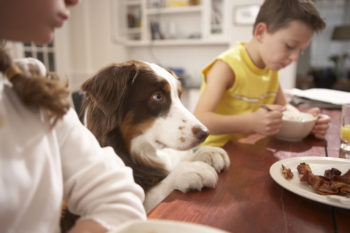Should I Give Human Food To My Pet?
When a pet is begging for food, it is sometimes hard to resist giving them a little taste of your meal. Before you do this, though, it is important to know which foods are OK to give as treats and which can cause serious health concerns.
Kaitlyn Upton, a veterinary student at the Texas A&M College of Veterinary Medicine & Biomedical Sciences, discusses some common human foods that are either safe or toxic to pets.
Though pets of all kinds are known to beg, dogs tend to do so most often. There are several human foods that can be given to dogs occasionally.
“Lean meats can be a great treat if you want your dog to feel a little bit of extra love,” Upton said. “You can easily add them in to one of your pet’s meals—just avoid fatty pieces or meat with lots of spices or seasoning.”
Meats with high fat content can cause stomach upset, including vomiting and diarrhea. It is also best to avoid seasoned meats that may contain high levels of sodium or toxic seasonings such as onion. Pets should also never be fed bones, which are a serious choking hazard.
Raw vegetables such as green beans and carrots also make great treats for dogs; green beans can be great for training because of their low calorie content, and carrots can help with teeth cleaning.
Upton also recommended occasionally adding canned pumpkin to meals to increase a dog’s fiber intake, which can help with weight loss. Like meats, these vegetables should not have any extra flavorings or seasonings.
While there are several human foods that are safe for dogs, there are also many that can cause serious health problems. The most well-known of these dangerous foods is chocolate.
“In addition to potentially harmful levels of caffeine, chocolate contains a compound called theobromine, which is toxic to dogs,” Upton said, adding that dark and pure baker’s chocolate contain the highest amounts of theobromine, but all types of chocolate should be kept away from dogs.
Upton also said to avoid feeding dogs grapes and raisins, which can cause kidney failure, or plants from the onion family, which can damage red blood cells.
“Most people do not try to feed their dogs whole onions or garlic cloves,” she said. “However, it is easy to forget that we often use garlic and onion salts on our meats or when cooking vegetables.”
All of these toxic foods have the same effects on cats as they do on dogs, though Upton said garlic can be even more harmful to our feline friends.
Cats can also be given the same human food treats as dogs, but because of their carnivorous diet they should not be given too many vegetables.
She advises keeping toxic foods out of the reach of pets and being aware of the types of seasonings you use when cooking.
Symptoms from eating toxic foods can take up to a day to develop and may not be noticed right away. The most common symptoms are vomiting, diarrhea, weakness, and seizures.
It is helpful to keep a phone number for an animal poison control center or emergency veterinary clinic in an easily accessible location. The ASPCA poison control line is open 24 hours every day at 888-426-4435.
Upton says pets should generally keep a consistent diet to avoid any gastrointestinal tract issues, and any major food changes should be done gradually and discussed with a veterinarian.
Pet Talk is a service of the Texas A&M College of Veterinary Medicine & Biomedical Sciences. Stories can be viewed on the web at vetmed.tamu.edu/pet-talk. Suggestions for future topics may be directed to editor@cvm.tamu.edu .






